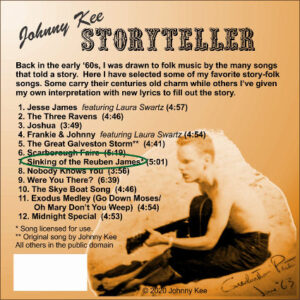The Sinking of the Reuben James
 The Sinking of the Reuben James
The Sinking of the Reuben James
This is about a song that I learned back in the early ’60s that described events in the not so distant past at that time. It was just over 20 years since the beginning of World War II and many of our parents had served in that war (including both my mom and dad in the Navy), so it was personal. This is the back story for The Sinking of the Reuben James.
After Hitler rolled over most of Europe in 1939, his next target for conquest was Great Britain. He planned a sea assault, but knew that his Luftwaffe (the German air force) had to gain air superiority before such an attack had any chance for success. The Luftwaffe initiated an air campaign that centered around near constant bombing between July 1940 and June 1941. That campaign was called the “Battle of Britain.”
But the “Battle of Britain” became the first major defeat for the German war machine. So Hitler turned his attention to putting Great Britain under siege to starve her out. The German Navy included a huge fleet of U-boats (submarines) deployed to attack any merchant ship that carried supplies for Britain. For protection, merchant ships traveled in convoys. The U.S. Navy provided destroyer escorts for these convoys as far as Iceland, where the British Navy took over the protection of these ships for the rest of the way to British ports.
The World War I destroyer USS Reuben James joined the ships on Atlantic convoy escort duty in March 1941. On October 23 she joined four other destroyers to escort Convoy HX156 leaving Newfoundland for England. She had a crew of 7 officers and 136 enlisted sailors and one “enlisted passenger.” On the morning of October 31 she was near Iceland when a German “wolfpack” (group of U-boats) appeared. The Reuben James positioned herself between the known position of the wolfpack and a munitions ship. The U-552 under command of Kapitanleutnant Erich Topp fired a torpedo that blew the entire bow off the Reuben James when it hit a magazine. The bow went down immediately, but the rest of the ship survived for 5 minutes before also sinking. Of the 144 on board, 100 perished and 44 were saved, all of whom were enlisted; no officer survived. The Reuben James became the first American warship sunk in combat in World War II, just five weeks before the Japanese attack on Pearl Harbor and our subsequent formal declaration of war.
The song The Sinking of the Reuben James was written by singer/songwriter Woody Guthrie, first published in 1942. Guthrie is best known for the popular folk songs This Land is Your Land and Pastures of Plenty among the many he has written. For this song, he used the melody of the antebellum song Wildwood Flower by Joseph Philbrick Webster and made popular by the Carver Family, who first recorded it in 1928. When Guthrie started this song, he wanted to include each of the names of the lost sailors, but instead included a chorus that asked. “Tell me, what were their names?”
The Sinking of the Reuben James has been recorded by many folk singers and groups. I learned it from the Kingston Trio (on their 1961 album Close Up) and the Chad Mitchell Trio (on their 1963 album Reflecting). This is the only song on my Storyteller CD that is still under copyright protection, for which I purchased the license to include. I made no significant changes to the lyrics or added any verses to this song, as I did in my new interpretations of other songs for this CD.
Listen to a 1 minute preview of this track here:
